| Opal Butterfly |
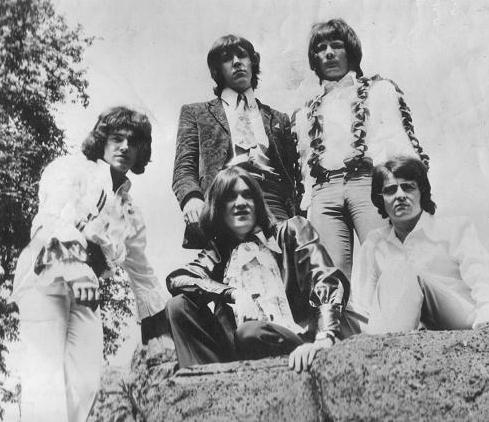 |
| (Left
to Right) Alan Love - Richard Bardey (top) - Simon King -
Robbie Milne - Tom Doherty |
Cardboard Heaven
Line-up (Left to Right) : Roger Warner (bass); Robbie
Milne (guitar); Simon King (drums); Alan Cobb (centre,
keyboards) and Den and Stu (front, vocals).
Opal Butterfly was
born out of Cardboard Heaven who were an Oxfordshire
based band (circa 1967), playing mainly local clubs and
dance halls, the group's set contained mostly soul and
R&B standards.
Opal
Butterfly
Later that year Simon King formed Opal Butterfly inviting
old band member Robbie Milne along the way. Robbie had
previously worked with a local Dicot group whose most
notable member was Arthur Brown who was then a student at
Reading University. The remaining line-up was made up
with Allan Love (vocals); Richard Bardey (bass) and Tom
Doherty (guitar). Tommy : "The name came about when
I was looking at a butterfly on my wall in a case, but
Butterfly by itself was a bit dull, so we thought of
something more colourful".
|
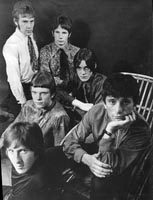 |
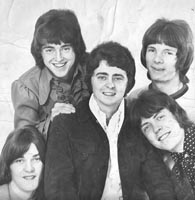 |
CBS Records
Before
signing with CBS, the band did two demo tracks (covers)
at a studio in London, "I Had Too Much To Dream Last
Night" and "Wind Up Toys". From a music
paper of the time:
In fact, these
young men were participating in an exercise new to
the pop world. They were commuting to a rehearsal
room to spend their whole day practising and
composing. They have spent a solid six months doing
just this every day. Not once have they made a public
appearance. The aim, I am told, has been to create an
original and unusual stage act - "A fresh
musical experience".
|
Their
first official recording was "Beautiful Beige/Speak
Up", released in 1968, described in the press as a
"crisp debut" and an "amiable slice of
harmony pop psychedelia". From the beginning, Opal
Butterfly were managed by Geoff Hibberd and Bernard
Cochrane, represented by Starlight Artistes and publicity
was handled by Brian Longley.
Opal Butterfly's second single was a cover of the Who's
"Mary Anne with the Shaky Hand", with the
rather famous "My Gration Or?", clocking in at
a whopping 7 minutes, 27 seconds. "Mary
Anne..." was described in the press as "opting
for a more energetic and grandiose approach than the
Who's own rendition".
As a point of interest, Alan Cobb of Cardboard Heaven
guested on this session and on 'Beautiful Beige' there
was a session man on harpsicord.
OB toured throughout 1969 and 1970, playing around 90
minute sets including covers of 'Sunshine of Your Love';
'My White Bicycle'; 'Flames' and 'The Great Banana Hoax'
. Their live performance at the time was closer to 'My
Gration Or?' and the two demos (mentioned above) than the
two singles suggested. |
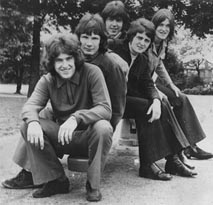 |
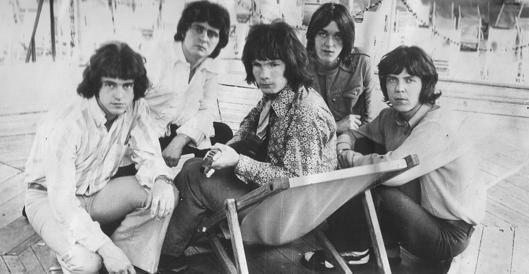
In 1969, the band split
and Robbie formed another Opal Butterfly line-up with replacement
musicians, namely Ray Owen (vocals, also of Moon and Juicy Lucy),
Davy O'List (guitar), XX (bass) and Mike Burchett (drums) but
this line-up only lasted a short while because Tommy and Simon
formed their own version of Opal Butterfly....
Groupie
Girl

With the new
Opal Butterfly line-up, briefly including Lemmy (guitar, also
later of Hawkwind and Motorhead) and then Ray Major (guitar), and
Tommy changing to bass they recorded a third single,
"Groupie Girl / The Gigging Song" on Polydor and also
appeared briefly in the B movie "Groupie Girl"
(Directed by Derek Ford and starring Esme Johns; Billy Boyle;
Richard Shaw and Donald Sumpter), Lemmy incidently had been
kicked out of the band before the single and film.
Around 1970, the group
finally split up and went their separate ways, with Simon moving
on to Hawkwind, after an introduction from Lemmy.
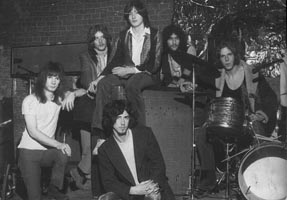 Fine China
Fine China
Meanwhile
Robbie joined the 'New Look Soul Band' who were later to become
Fine China.
Fine China were a six-piece soul band based primarily in London
but spent most of their time touring in Germany. Formally called
the New Look Soul Band, they changed the name due to mainly
Robbie's Opal Butterfly influences towards a heavier style of
music (namely Jeff Beck; Jethro Tull and Cream styled numbers).
They never recorded any singles and were an excellent live band,
the most notable member being Michael Barrymore on keyboards.
Their line-up from left to right were Robbie (guitar); Mike
Holmes (sax and flute); Bob Hardy (sax); Allan Shephard (bass);
John Moore (vocals and drums) and Micky Parker (keyboards). The
group split up in 1971.
Hear the Opal Butterfly
sounds : HERE
Contact Robbie Milne : HERE
Many thanks
to Robbie for the help in getting this page set-up, much
appreciated!!







 Fine China
Fine China